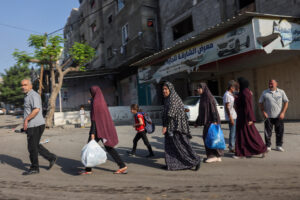January is Human Trafficking Prevention Month: Part 2 By: Justice Venture International [As we start the new…
Gratitude in the Midst of Suffering
By Liz Curfman, Program Associate
[The Rees-Jones Foundation staff have been reflecting on the joy and gratitude we have even in the midst of hard times. As we continue to invest in the flourishing of children and families, we wanted to take time to pause and comment on the hope we have in the face of suffering–in our own lives and in the lives of those in our communities. Program Associate Liz Curfman shares thoughts here surrounding her work in the Middle East and how she has learned to walk through suffering well. We hope you are encouraged.]
Suffering. A word so strong, that we instantly have a definition of what it looks like. For me, my definition comes from my time working in the Middle East.
In the spring of 2013, I worked for an evangelical humanitarian aid agency who was assigned to the Middle East as they were experiencing the humanitarian crisis at the beginning of the Syrian civil war. In the ongoing work of providing tangible comfort through humanitarian items, I also worked with local Christians on how to provide lay counseling to Syrian refugees. During my time there, I made a visit to a United Nations outpost where Syrians would register as refugees – a protected class that would provide them with support and resources as children and families worked to stabilize and find a new home, whether that new home was a neighboring country or elsewhere across the globe.

An image that I’ll never forget is a line so long of people, waiting to forgo their home country to become stateless, that I couldn’t see the end of it. Every single person, created in God’s image, was looking to survive a war they didn’t start, fleeing a country they called home, and hoping for a safe, new home where they could safely raise their families. A line of human suffering so long, you couldn’t see the end of it.
This is the reality of our world. Whether it’s from the ongoing crises in the Middle East, Ukraine or if it’s closer to home in our own country, or our own communities. Affliction, and evil committed against our fellow image bearers of God – it keeps us up at night, it brings tears to our eyes, or causes us to shut down to avoid it altogether. As we head into a season of giving thanks, and celebration of the birth of our Savior, it’s easy to feel robbed of joy. How can there be gratitude and joy when there is so much tragedy?
As believers, we can turn to the Bible to see over and over again in trials and tribulations that God was still there. He is constant, and unchanging. In Isaiah 53, we read a prophecy about Jesus – it’s often referred to as the “Suffering Servant” passage. Isaiah 53:3a reads “He was despised and rejected of men; a man of sorrows, and acquainted grief. . .” What a comfort, joy, and beacon of thankfulness we as followers of Christ have that Jesus Christ understands our heartbreak – whether it plays out on the global stage, or in our own homes. He carries our grief with us as we witness atrocities committed against children and families.
We too easily try to take joy and comfort in avoiding pain or suffering, or acting like it does not exist…but drawing a silver lining on a gray sky is temporary. Instead, we take joy and comfort in the One who is permanent, who does not change, who is present with us in every moment as we take in heartbreaking news, or see global suffering that is too much for our souls to bear, or as we say unexpected goodbyes. He is still here, acquainted with our grief and ready to carry us through our darkest moments. What hope we truly do have on this side of eternity!
In light of the approaching celebration of Christmas, I wanted to share one of my favorite poems. It’s one by Henry Wadsworth Longfellow titled “Christmas Bells.” You can read it here:
And in despair I bowed my head;
“There is no peace on earth,” I said;
“For hate is strong,
And mocks the song
Of peace on earth, good-will to men!”
Then pealed the bells more loud and deep:
“God is not dead, nor doth He sleep;
The Wrong shall fail,
The Right prevail,
With peace on earth, good-will to men.”
Longfellow wrote the piece on Christmas Day in the midst of the United States’ Civil War, one of the most brutal times in our country’s history. It’s a reflection of Longfellow hearing the peals of beautiful church bells on Christmas Day. He wonders to himself: “How can such beauty and joy exist when such suffering is happening?” Longfellow’s closing line brings such comfort and a reminder that God is here. He is present with us in our personal suffering and in suffering around the globe. He is here in the right NOW. Filled with mercy, and compassion – tending to the afflicted, comforting the brokenhearted, and bringing hope to the hopeless. He carries our burdens with us. We take and find comfort and joy knowing we never need to walk alone in our darkest moments.
Share this post:
Category: Original ContentUncategorized
January is Human Trafficking Prevention Month: Part 1 By Shellie Velasco, Program Officer [As we start the…
Welcome to 2025 By Adrian Cook, Director of Research & Evaluation “But the steadfast love of the…

